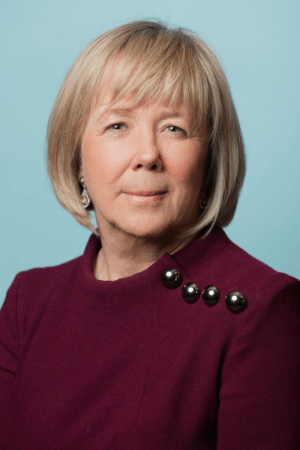Cappy Daume
Chief Portfolio Manager, The Davis Cos.
Age: 59
Industry experience: 34 years
Turbulent financial markets have whipsawed the commercial real estate industry and made it harder for developers to find promising investments delivering strong returns. At the same time, opportunities are emerging to partner with owners of distressed assets being affected by rising project costs and interest rates. Cappy Daume leads The Davis Cos.’s portfolio management division and participates in the firm’s investment committee, a position in which she evaluates potential acquisitions, executes the business plan on the company’s 14-million-square-foot portfolio and decides when to pull the trigger on dispositions.
Q: What do you consider to be Boston’s strengths and weaknesses compared to other metros in which Davis Cos. is invested?
A: Most of our capital ends up being invested from New York to Boston, but the mid-Atlantic is a targeted region for us and we will go outside of that strategically. I’ve been with Jonathan Davis for 14 years, and generally speaking, there’s not been as much distress in Boston as there has been in other markets across the country.
For us, investing in Boston has had to be very laser-focused: If we feel like we can create something that’s distinct and we get the opportunity at the right basis. But it’s not a wholesale getting in front of the market and buying the market and the market is rising. It’s much more of a targeted approach. With interest rates having doubled in a short period of time, there is definitely stress in most project budgets.
I’m a big believer in Boston and I’ve been through many cycles at this point, in a 34-year career, and I believe the cornerstones and foundation of the Boston economy are very solid. But even in the life science market it has slowed down or been constricted. The amount of science discovery we have in front of us is going to accelerate and I think Boston benefits from that. You layer in robotics and AI and advanced manufacturing and clean tech, that’s part of our future. That’s going to carry us through in the long run, assuming we don’t kill the golden goose.
Q: Do you have a timetable for the start of the 1234-1240 Soldiers Field Road multifamily and hotel project that was approved last spring?
A: We’re not actively seeking financing. What we’re trying to do is make sure we have a project that is economically feasible, and we try and find an equity partner that appreciates the unique location.
Q: Is The Davis Cos. still active in the office sector?
A: We started pivoting away from the office sector in the second half of Fund II and we had a record disposition year in 2021. We sold over $2 billion, so we have only two office buildings in the fund assets. One is fully leased for 6.5 years, and another one is down in Miami Beach and is 97 percent leased. So, we’re not living through the current vacancy struggles through the fund assets, but we’re not immune either because there’s a blanket of negativity around the office sector. You’ve got lenders that are concerned, and interest rates have doubled.
Q: How does the recent increase in Boston’s inclusionary development policy affect the multifamily development strategy?
A: It’s a huge consideration. Right now, while construction cost growth has started to slow down, construction costs have not reversed. And financing is that much more expensive, so it’s very challenging to be able to underwrite new development and have it be economically feasible. When you layer in more expensive regulations, it is adding to the mountain you’re climbing. It’s a challenge, and there’s going to need to be some creativity about how to move forward and create more inventory.
Q: During the previous economic downturn beginning in 2008, The Davis Cos. was active in acquisitions of distressed assets. Do you expect a similar opportunity in the near future?
A: I do. I think there are going to be a lot of different opportunities. Everything needs a catalyst to make things happen. Our first two deals in New York City were residential deals, and the catalyst is in New York the affordable program [tax incentive] is sunsetting in 2026. These were projects that got started and got caught in the financing shortage, and created gap financing needs. We’ve provided some gap equity needs on two development deals in East Harlem and downtown Brooklyn, so that’s our first foray in it. It is not an easy time for existing real estate. It is a very opportune time, if you have fresh capital, to take advantage because there’s been a repricing and there’s going to continue to be a repricing of the market going on.
Q: What else worries you from an investment risk perspective?
A: Elusive understanding of where demand is coming from. That’s always an age-old consideration. That can be hard to see right now. And insurance is becoming a real meaningful part of the underwriting process. It’s very difficult to understand where insurance costs are going. For the first time in my career, that’s a huge consideration.
Editor’s note: This report has been updated to reflect that Davis Cos.’ portfolio size is 14 million square feet.
Daume’s Five Most Recently-Completed Books
- “Code Breaker” by Walter Issacson
- “The Book of Joy: Lasting Happiness in a Changing World” by His Holiness the Dalai Lama, Desmond Tutu and Carlton Abrams
- “The Covenant of Water” by Abraham Verghese
- “Lifespan: Why We Age and Why We Don’t Have To” by David Sinclair
- “There There” by Tommy Orange






